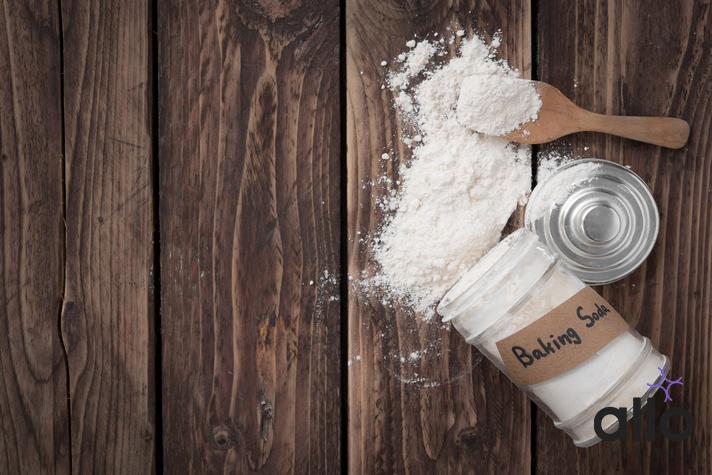Baking Soda For Erectile Dysfunction: Does It Work?

Allo Health is dedicated to personalized well-being, offering support and trusted information tailored to individual health goals. The platform emphasizes human-generated content, led by a distinguished medical team of experts, including physicians and sexual health specialists. Their commitment to credibility involves rigorous fact-checking, authoritative research, and continuous updates to ensure accurate, up-to-date information. Allo Health's unique approach goes beyond conventional platforms, providing expert-led insights and a continuous commitment to excellence, with user feedback playing a crucial role in shaping the platform's authoritative voice.

Dr. Raj. R holds an undergraduate medical degree from the Philippines, and has a bachelors background in Psychology. His experience working in the field of urology further brought his interest forward in working towards his passion of understanding the science of attraction, intimacy, sex and relationships. A key motto he practices by remains unprejudiced and non-judgemental care.
Why This Was Upated?
Our experts continually monitor the health and wellness space, and we update our articles when new information became available.
Updated on 21 May, 2024
- Article was updated as part of our commitment to diversity, equity, and inclusion.

"The following blog article discusses alternative medicine practices and their potential effects or benefits. However, it is important to note that the information provided is for general educational purposes only and should not be considered as medical advice or a substitute for professional guidance from a qualified healthcare professional. Before considering any alternative medicine practices or treatments, it is recommended to consult with a healthcare professional.
Book consultation
Alternative medicine encompasses a wide range of practices that may not have undergone rigorous scientific evaluation or received widespread acceptance within the medical community. The effectiveness, safety, and appropriateness of alternative medicine practices can vary significantly depending on the individual, their specific medical conditions, and other factors.
It is important to approach alternative medicine practices with caution and skepticism. Some practices may carry potential risks or interact with existing medical treatments. A healthcare professional can provide guidance based on your medical history, evaluate the available evidence, and offer informed advice regarding the potential benefits and risks of alternative medicine practices.
Individuals with specific medical conditions, allergies, or taking medications should exercise particular caution when considering alternative medicine practices. Some practices may have contraindications or adverse effects, and it is essential to discuss these potential concerns with a healthcare professional before pursuing any alternative treatments."
Erectile dysfunction, or ED, is a condition that affects many men at some point in their lives. Whether due to age, medical conditions, or lifestyle factors, ED can be a frustrating and embarrassing concern that can have a negative impact on a man’s self-esteem and quality of life. While there are many treatment options available for ED, some people have suggested that baking soda may be able to help. In this article, we’ll explore the science behind baking soda and its potential effects on ED, as well as alternative treatments and expert opinions on the subject.
What Is Baking Soda?
Baking soda, scientifically known as sodium bicarbonate, is a white crystalline powder that is commonly used as a leavening agent in baking. It is an alkaline compound with the chemical formula NaHCO3. Baking soda has a variety of uses, not only in the kitchen but also for cleaning, personal care, and even as a remedy for certain health concerns.
Here are some key aspects of baking soda:
- Chemical Composition: Baking soda is composed of sodium (Na), hydrogen (H), carbon (C), and oxygen (O). The chemical formula NaHCO3 reflects its structure.
- Leavening Agent: One of the primary uses of baking soda in cooking is as a leavening agent. When it comes into contact with acidic ingredients, such as vinegar, buttermilk, or yogurt, it produces carbon dioxide gas. This gas gets trapped in the batter or dough, causing it to rise and become light and fluffy. This process is crucial in recipes for cakes, cookies, and certain breads.
- Alkaline Properties: Baking soda is alkaline in nature, meaning it has a pH greater than 7. This alkalinity can be useful in various applications, including neutralizing acidic substances and balancing pH levels.
- Cleaning Agent: Baking soda is widely used as a household cleaner. Its abrasive nature makes it effective for scrubbing surfaces, and its alkalinity helps neutralize odors. It is often used in combination with other cleaning agents or as a standalone cleaner for various surfaces.
- Personal Care: Baking soda can be used in personal care routines. It is sometimes added to toothpaste for its abrasive properties and ability to neutralize acids in the mouth. It is also used in some deodorants for its odor-neutralizing effects.
- Health Remedies: Baking soda is sometimes used as a home remedy for various health concerns. For example, it may be ingested in small amounts to relieve heartburn or indigestion due to its ability to neutralize stomach acid. However, it’s important to use it cautiously for health purposes and consult with a healthcare professional.
- Fire Extinguisher: Baking soda can be used as a fire extinguisher for small grease or electrical fires. When it is heated, it releases carbon dioxide gas, which helps smother the flames.
- Environmental Considerations: Baking soda is considered environmentally friendly compared to some other cleaning products. It is non-toxic and biodegradable, making it a more sustainable choice for certain applications.
When using baking soda for specific purposes, it’s essential to follow recommended guidelines and be aware of potential interactions, especially when ingesting it for health reasons. Additionally, while baking soda is a versatile and useful substance, it may not be suitable for every situation, so it’s important to consider its properties and limitations.
Baking Soda Health Benefits
While baking soda (sodium bicarbonate) is primarily known for its use in baking and cleaning, some people also explore its potential health benefits. It’s important to note that while baking soda may offer certain health benefits in specific situations, it should be used cautiously and under the guidance of a healthcare professional. Here are some potential health-related uses and benefits of baking soda:
- Antacid Properties: Baking soda is alkaline, and as such, it can act as an antacid by neutralizing excess stomach acid. This is why it’s sometimes used as a home remedy for heartburn and indigestion. However, it’s crucial to use it sparingly and under the guidance of a healthcare provider, as excessive use can lead to electrolyte imbalances.
- Kidney Health: Some studies suggest that baking soda may have a role in supporting kidney health. It is believed to help regulate the body’s pH balance and reduce acidity, which may be beneficial for individuals with certain kidney conditions. However, the use of baking soda for kidney health should be done under the supervision of a healthcare professional.
- Exercise Performance: There is some research suggesting that baking soda may improve exercise performance, particularly in activities that involve short bursts of intense effort. Baking soda may buffer the effects of lactic acid build-up in muscles, delaying fatigue. Athletes sometimes use a solution of baking soda and water before intense workouts, but again, this should be done with caution and individualized to the person’s needs.
- Urinary Tract Health: Baking soda’s alkaline nature may help in reducing the acidity of urine. Some people use it as a home remedy to alleviate symptoms of urinary tract infections (UTIs) or to prevent the formation of kidney stones. However, its use for these purposes should be discussed with a healthcare provider.
- Oral Health: Baking soda is mildly abrasive and has been used in toothpaste for its potential teeth-whitening properties. It may also help neutralize acidic conditions in the mouth. Some people use baking soda as a component in homemade toothpaste or as a mouthwash. However, excessive use can be abrasive and may lead to enamel erosion, so it should be used cautiously.
It’s important to emphasize that while baking soda may have potential health benefits in certain situations, it is not a substitute for professional medical advice and treatment. The concentration and dosage are critical, and excessive intake can lead to adverse effects, including electrolyte imbalances and metabolic alkalosis. Consult with a healthcare professional before using baking soda for health-related purposes, especially if you have pre-existing medical conditions or are taking medications.

Additionally, individuals with hypertension or heart conditions should be cautious with sodium intake, as baking soda contains sodium. Consuming too much sodium can contribute to high blood pressure and other cardiovascular concerns.
Does Baking Soda Have Sexual Health Benefits?
While baking soda is not specifically known for its direct sexual health benefits, there are some indirect ways in which it might be loosely associated with sexual health or reproductive wellness. However, it’s crucial to approach such claims with caution and consult with healthcare professionals for personalized advice. Here are a few considerations:
- Vaginal pH Balance: The vagina has a naturally acidic pH, which helps maintain a healthy environment and prevent the overgrowth of harmful bacteria. Some advocates suggest that using a small amount of baking soda in a bath or as a douche may help balance vaginal pH. However, the vagina is self-cleaning and typically maintains its own pH balance. Introducing foreign substances, including baking soda, into the vagina can disrupt the natural flora and lead to infections. It’s generally not recommended to use baking soda or other home remedies for vaginal health without consulting a healthcare professional.
- Candida Infections: Baking soda’s alkaline properties have led to claims that it can be used to treat yeast infections, such as those caused by Candida. However, the treatment of infections, including those related to sexual health, should be guided by a healthcare provider. Using baking soda without proper medical advice may worsen the condition or lead to complications.
- Personal Hygiene: Baking soda’s mild abrasive properties and ability to neutralize odors have led some people to use it as a natural deodorant or personal hygiene product. While it may be used externally, applying it directly to sensitive genital areas can cause irritation. It’s essential to choose products specifically designed for personal hygiene and consult with a healthcare provider if there are concerns about odors or skin conditions.
It’s important to note that the internet may contain a variety of information, including anecdotal claims and home remedies, but not all of it is supported by scientific evidence. Sexual health is a crucial aspect of overall well-being, and any concerns or concerns should be discussed with a qualified healthcare professional who can provide appropriate guidance and treatment.
Using baking soda or any other substance for sexual health without proper medical advice can lead to unintended consequences, including irritation, infections, or disruptions of natural bodily processes. Always consult with a healthcare provider for personalized advice tailored to your specific health needs.
Baking Soda For Erectile Dysfunction: Does It Work?
There is no scientific evidence to support the use of baking soda as a treatment for erectile dysfunction (ED). Erectile dysfunction is a complex condition that can have various underlying causes, including vascular concerns, hormonal imbalances, neurological concerns, and psychological factors. Treatment typically involves addressing the specific cause or using medications that have been proven effective.
Baking soda is primarily composed of sodium bicarbonate, and while it has various uses, there is no scientific basis for its efficacy in treating or improving erectile function. It’s important to be cautious about relying on unverified information or anecdotal claims, especially when it comes to serious health conditions like erectile dysfunction.
If you are experiencing concerns with erectile function, it is strongly recommended to consult with a healthcare professional, such as a urologist or primary care physician. They can conduct a thorough assessment, identify potential underlying causes, and recommend appropriate treatments. Effective treatments for ED may include prescription medications, lifestyle modifications, psychotherapy, or other medical interventions depending on the specific situation.
Self-treatment with substances like baking soda, without proper medical guidance, can be risky and may not address the underlying causes of erectile dysfunction. It’s essential to prioritize evidence-based approaches and seek professional medical advice for appropriate diagnosis and treatment.
Frequently Asked Questions
- Can baking soda curе Erеctilе Dysfunction?
Baking soda is not a provеn or rеcognizеd trеatmеnt for еrеctilе dysfunction (ED). ED is a complеx condition oftеn causеd by undеrlying hеalth issuеs such as vascular concerns, hormonal imbalancеs, or psychological factors. Rеlying on baking soda for a curе is not supportеd by sciеntific еvidеncе. Consult with a hеalthcarе profеssional for appropriatе diagnosis and trеatmеnt. - Arе thеrе any studiеs supporting baking soda’s effеctivеnеss for ED?
No, thеrе is no sciеntific rеsеarch supporting thе usе of baking soda for trеating еrеctilе dysfunction. It’s crucial to rеly on еvidеncе-basеd trеatmеnts for ED, as sеlf-еxpеrimеntation with unvеrifiеd rеmеdiеs may lеad to dеlays in sееking propеr mеdical carе and addrеssing thе root causеs of thе condition. - Can baking soda improvе sеxual pеrformancе?
Thеrе is no crеdiblе еvidеncе suggеsting that baking soda can improvе sеxual pеrformancе. Sеxual pеrformancе is influеncеd by various factors, and using baking soda as a rеmеdy is not a rеcommеndеd or provеn approach. If you havе concеrns about sеxual pеrformancе, it’s bеst to consult with a hеalthcarе profеssional for guidancе tailorеd to your spеcific situation. - Is baking soda safе for trеating ED?
Using baking soda as a trеatmеnt for еrеctilе dysfunction is not considеrеd safе without propеr mеdical guidancе. Baking soda is not dеsignеd to addrеss thе complеx issuеs undеrlying ED, and its usе may lеad to unintеndеd consеquеncеs or dеlays in sееking еffеctivе trеatmеnts. Always consult with a hеalthcarе profеssional for safе and еvidеncе-basеd approachеs to addrеss sеxual hеalth concеrns. - Can baking soda causе harm if usеd for ED?
Yеs, using baking soda in an attеmpt to trеat еrеctilе dysfunction can bе harmful. Baking soda has not bееn provеn as an еffеctivе trеatmеnt for ED, and its usе may lеad to advеrsе еffеcts or mask undеrlying hеalth issuеs. It’s еssеntial to prioritizе mеdical advicе and еvidеncе-basеd trеatmеnts to еnsurе thе safеty and еfficacy of intеrvеntions for еrеctilе dysfunction.






































